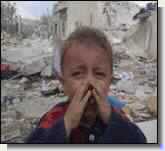The Palestinian interior minister said in an interview published on Friday that militants must halt resistance bombings against Israelis or else face "isolation" by Palestinian society. "Stop the resistance bombings, stop the murders for no reason," Abdel Razzak al-Yahya said in remarks to an Israeli newspaper published a day after Israeli troops killed four members of a Palestinian family in Gaza, drawing Hamas vows of retaliation.
The Israeli attack, which prompted Defense Minister Binyamin Ben-Eliezer to express regret and order an occupation army investigation, put new strains on a nearly two-week-old security deal meant to lay the groundwork for a cease-fire.
It also dealt a fresh blow to efforts by Yahya, named interior minister in June as part of a series of reforms demanded by Washington, to convince militants groups that resistance attacks hurt the Palestinian nationalist cause.
Raising the specter of conflict on a second front, Israel demanded Syria and Lebanon restrain Hizbollah guerrillas or face retaliation after an attack on the northern border on Thursday that wounded three soldiers and drew Israeli air strikes.
Israeli security sources said Ben-Eliezer told visiting U.S. Deputy Assistant Secretary of State David Satterfield in talks late on Thursday that Israel would not remain idle if Hizbollah artillery and missile fire continued.
YAHYA CALLS FOR RESTRAINT
In an interview with the Yedioth Ahronoth newspaper before the Gaza killings, Yahya called on militants to "return to the legitimate struggle against the occupation, without violence."
"Resistance attacks are contrary to the Palestinian tradition, are against international law and harm the Palestinian people," he was quoted as saying. "It is not necessary to respond or take revenge for every act. Both sides must act with restraint."
Yahya acknowledged his failure to secure agreement for an end to attacks in meetings earlier this month in Gaza, though he said in each faction he had "found people willing to hear these ideas."
But he added: "If the resistance attacks continue, these factions will find themselves isolated in Palestinian society."
Despite Yahya's warning, recent opinion polls have shown that a majority of Palestinians approve of resistance bombings on Israelis in the 23-month-old Palestinian uprising against occupation of the West Bank and Gaza Strip.
Palestinian President Yasser Arafat called the Israeli occupation army's deadly strike on Thursday in the Gaza Strip coastal village of Sheikh Ijleen a "deliberate crime" aimed at sabotaging peace efforts.
The militant group Hamas, which has killed scores of Israelis in a wave of resistance attacks, vowed to avenge the deaths.
"The Israeli massacres, assassinations, arrests, house demolitions and deportations will increase the determination of this people to proceed in the path of resistance and jihad," Hamas founder Sheikh Ahmed Yassin said in a message read at the Gaza rally by an aide because he was too ill to attend.
SECURITY PLAN UNDER STRAIN
The Israelis and Palestinians agreed on a "Gaza-Bethlehem First" plan last week under which Israel was to ease its military clampdown in the Gaza Strip and the West Bank city in return for Palestinian security forces deploying to ensure calm.
But the deal has frayed in the face of persistent violence.
In the Sheikh Ijleen attack, Israeli tanks fired rounds that sprayed thousands of dart-like flechettes, Palestinian doctors said.
The dead were identified as Ruwaida Al-Hajeen, 55, her sons, Ashraf, 23, and Nihad, 17, and a cousin, Mohammed, 20. Their bodies were left slashed and torn by the blast.
An occupation army spokesman said troops guarding the Jewish settlement of Netzarim opened fire when they saw "suspicious figures" crawling in the direction of the Jewish settlement.
Netzarim and other settlements in the West Bank and Gaza Strip have become frequent targets for Palestinian militants.
Israeli troops remain in six West Bank cities and nearby towns they reoccupied after a spate of resistance bombings in June.
At least 1,517 Palestinians and 589 Israelis have been killed since the uprising began after peace talks froze.
PHOTO CAPTION
Palestinian youths set fire to trash cans and tires during an Israeli army imposed curfew in the West Bank City of Ramallah August 29, 2002. Israeli tanks have killed four members of a Palestinian family in a raid on the Gaza Strip, drawing vows of revenge from Hamas militants and fraying a security deal meant to lay the groundwork for a ceasefire. (Osama Silwadi/Re
- Author:
& News Agencies - Section:
WORLD HEADLINES


 Home
Home Discover Islam
Discover Islam Quran Recitations
Quran Recitations Lectures
Lectures
 Fatwa
Fatwa Articles
Articles Fiqh
Fiqh E-Books
E-Books Boys & Girls
Boys & Girls  Hajj Rulings
Hajj Rulings Hajj Fatwas
Hajj Fatwas














